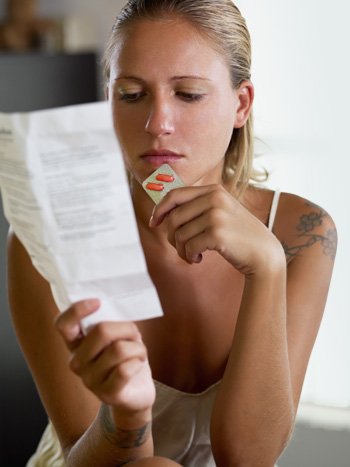 Emergency contraception -- also called postcoital contraception -- is a form of birth control that may be used by women who have had unprotected sex or used a contraceptive method that failed. The treatment generally is reserved for emergency situations and is not a regular method of birth control. Emergencies include being raped, having a condom break or slip off during sex, missing two or more birth control pills during a monthly cycle, and having unplanned sex. Emergency contraception is not a form of abortion; it is used to prevent a pregnancy, not end one. Emergency contraception does not protect against sexually transmitted diseases. It is not RU-466, the medication used to induce abortions.
Emergency contraception -- also called postcoital contraception -- is a form of birth control that may be used by women who have had unprotected sex or used a contraceptive method that failed. The treatment generally is reserved for emergency situations and is not a regular method of birth control. Emergencies include being raped, having a condom break or slip off during sex, missing two or more birth control pills during a monthly cycle, and having unplanned sex. Emergency contraception is not a form of abortion; it is used to prevent a pregnancy, not end one. Emergency contraception does not protect against sexually transmitted diseases. It is not RU-466, the medication used to induce abortions.
Plan B One-Step is a specifically packaged emergency contraception.
- If you are 15 or older, you can get Plan B from a pharmacist, without a prescription. Bring proof of your age.
- If you are younger than 15, you can get Plan B with a prescription from a doctor.
Ella is a non-hormonal pill. It contains ulipristal, a non-hormonal drug that blocks the effects of key hormones necessary for conception. It is available only by prescription.
How Does It Work?
Plan B One-Step emergency contraception may prevent pregnancy by temporarily blocking eggs from being produced, by stopping fertilization, or by keeping a fertilized egg from becoming implanted in the uterus. Plan B One-Step is taken in one dose with one pill. Its effectiveness depends on how soon you take the Plan B pill. It should be taken as soon as possible -- within 72 hours of unprotected intercourse. When Plan B is taken as directed, it can reduce the chance of pregnancy by close to 90%.
Ella can be taken up to 120 hours after sex. It is taken as one tablet in one dose.
An IUD can be inserted to prevent pregnancy within five to seven days after unprotected intercourse.
How Effective Is Emergency Contraception?
If Plan B is taken as directed after unprotected sex, it will decrease the chances of a pregnancy occurring. About 7 out of every 8 women who would have gotten pregnant do not become pregnant.
In two reported studies, Ella significantly reduced the pregnancy rate from an expected rate of 5.5% and 5.6% to 2.2% and 1.9%, respectively. In a pooled analysis of the data, the effectiveness did not fade for 120 hours after unprotected sex.
An IUD can be up to 99% effective when inserted within 5 to 7 days after unprotected intercourse.
 Where Can I Get Emergency Contraception?
Where Can I Get Emergency Contraception?
Emergency contraceptive pills (ECPs) are available at Planned Parenthood; college, public, and women's health centers; private doctors; and some hospital emergency rooms.
Some doctors will prescribe ECPs over the phone and call the prescription in to a pharmacy. Plan B One-Step is available without a prescription to women 15 and older.
Who Should Not Use ECPs?
Plan B One-Step will not affect an existing pregnancy or cause harm to a fetus. Ella should not be used by women who are already pregnant or suspected to be pregnant. The risk to a human fetus is unknown. Animal studies have demonstrated risk of fetal loss. Also, women who have had clotting disorders or deep venous thrombosis (DVT) should not use Plan B.
Are There Any Side Effects Associated With Emergency Contraception Pills?
The most common side effects associated with emergency contraception pills include:
- Nausea
- Abdominal pain
- Fatigue
- Headache
- Menstrual changes
Ask your doctor or pharmacist about ways to reduce nausea. They may prescribe some anti-nausea medicine for you to take before you take an ECP.
Does It Protect Against Sexually Transmitted Diseases (STDs)?
No. Emergency contraception will not protect you from contracting an STD, such as HIV, the virus that causes AIDS. The best way to avoid getting STDs is to limit sexual contact to one uninfected partner. If that is not an option, use a latex condom correctly every time you have sex.